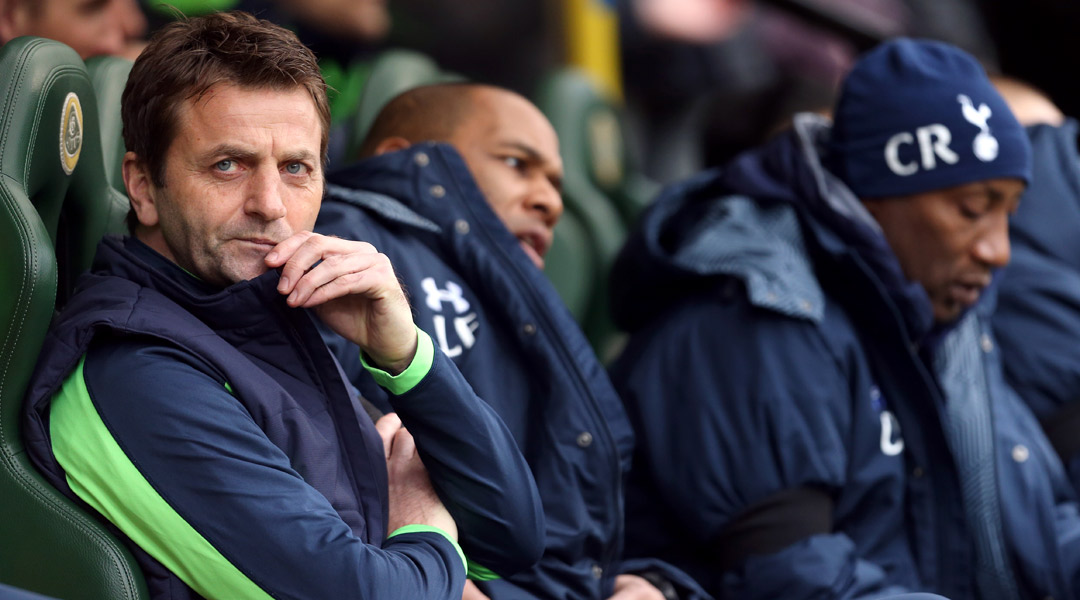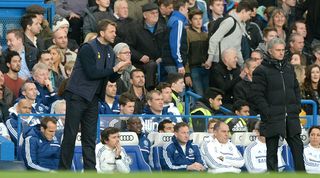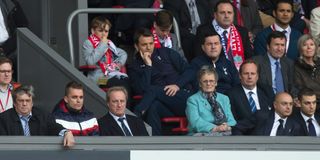How Tim Sherwood can save his managerial career
Matt Allen picks apart the outspoken Tottenham chief's White Hart Lane reign...

There are undoubtedly tumultuous weeks ahead for Spurs' interim manager (there – we've said it), Tim Sherwood. With Sky Sports News reporting his inevitable departure, twinned with a public admission that he wouldn't care for the club's No.2 role, it's unlikely he'll be working under chairman Daniel Levy and his seemingly unaccountable Director of Football system next season. West Brom has already been reported as a potential destination.
So where did it all go wrong? Initially lauded as a force of positivity by some sections of the media due to his forthright views, Sherwood has since been criticised by others for being a walking PR disaster, particularly after the public mauling delivered to his players in the wake of their 4-0 defeat to Chelsea earlier in the season.
Meanwhile, Spurs' topsy-turvy performances suggest a fractious element within his team: Sherwood possesses the best win rate of any Spurs manager in recent memory; on their day, his is a team that can fizz with flair and goals (though those days have been rare). Scratch the surface, however, and something seems very wrong at White Hart Lane. When Spurs lose, they lose badly, and in horrendous circumstances. Each of their thrashings this year – at the hands of City, Liverpool and Chelsea – have been triggered by defensive blunders from the Chuckle Brothers’ playbook. It's made for painful viewing at times.
Nevertheless, Sherwood's experiences, good and bad, might make for an interesting springboard into a more stable role. He is considered by many to carry some heavyweight potential, after all. This reputation will be given extra credence given he would have learned several key lessons during his brief stint at charge at Spurs. The trick will be building on them…
Get FourFourTwo Newsletter
The best features, fun and footballing quizzes, straight to your inbox every week.
1) Keep the office politics in-house
When Sherwood slammed his players' performance after the 4-0 mauling by Chelsea at Stamford Bridge, warning bells began to ring around White Hart Lane. A manager eager to berate his personnel in public is not a sought-after quality at most football clubs. Thing is, he's not alone: when Jose Mourinho pulled a similar stunt following Chelsea's defeat to PSG in the Champions League, the criticism seemed muted. Sherwood was quick to cry double standards.
"If I do it, it's wrong because I'm inexperienced and Mourinho's the best manager we've ever seen, supposedly," he said. "Obviously he gets a little bit more leeway because he has earned the right to say what he wants. People will say 'Who is Tim Sherwood to start having a go?' But I am realistic enough to know it's Tottenham, and you are under the spotlight no matter what you do."
That pressure will remain wherever he goes. Sherwood will just have to lump it.

2) Retain faith in youth
One of the plus points of Sherwood's stewardship has been the trust placed in the youth players at his disposal. Homegrown striker Harry Kane scored on his full league debut against Sunderland in Monday night's 5-1 win (it's arguable he would have scored twice had Adebayor not tapped in his goal-bound shot). Meanwhile, midfielder Nabil Bentaleb has been a first-team fixture since Sherwood's promotion in December. Both players have shown flashes of promise, though at times, Sherwood's reliance on Bentaleb when players of superior quality and experience have been available has appeared baffling. Still, he has been unswerving in his methodology.
"Sometimes you have to be put in and brought out," he says. "You need opportunities to play poorly, then play better, and then better still. You can't write someone off because he's not the best player to begin with. Everyone should have an equal opportunity."
Under the pressure of Champions League qualification, that faith might unnerve the risk-averse chairman. At a club of limited resources – a Norwich, or West Brom, say – Sherwood's youth policy could pay dividends, both competitively and in the financial market.
3) Tactics: Square pegs, square holes
At times, Sherwood has bemused Spurs supporters with several positively psychedelic team selections, most recently during the tonking by Liverpool at Anfield. In that fixture, Christian Eriksen – arguably the most creative player in his ranks, and a player who operates effectively behind a main striker – was positioned on the flank. Nacer Chadli, a natural winger, was placed behind lone striker Soldado.
As if that wasn't bemusing enough, Sherwood opted to play midfielders of attacking guile (Gylfi Sigurdsson) and inexperience (Bentaleb) when more muscular proponents in Sandro and Mousa Dembele remained on the bench. With limited resistance, Steven Gerrard and Jordan Henderson were able to get a stranglehold on the middle of the park as Liverpool cruised into a four-goal lead. This chastening experience would have delivered a harsh tactical lesson. It's one he'll need to learn from – and sharpish.

4) Harness his touchline antics
At times, Sherwood's honesty in press conferences has been viewed as a breath of fresh air. He rarely pulls punches with regards to performance and results. His frustrations and ambitions have been offered with a frank transparency uncommon in top-flight football.
Trouble is, his passionate persona has translated into some pretty ugly touchline scenes. During the 1-0 defeat to Arsenal in March he hurled his official club bodywarmer to the ground in despair; against Sunderland he argued with fans for not supporting full-back Danny Rose. "I can't apologise for it," he said after ‘giletgate’. "And I can't say it won't ever happen again… I've got to show my emotions. If I didn't, then I'd be acting and there's too many actors in this game. I just want to wear my heart on my sleeve."
In some cases, this could be seen as a positive break from the normal managerial decorum. With Sherwood, however, it's undoubtedly caused problems – as did a subsequent, self-imposed withdrawal to the stands for the away fixture with Liverpool (he later argued it was to manage the game from a superior witness point). The move infuriated travelling fans, to such an extent that they were heard to sing, "where is our manager?" as their team collapsed in humiliating circumstances.

5) Uncover his man-mangement potential
It seems to be a mixed bag where team morale is concerned at Spurs these days. Defender Jan Vertonghen has been playing with a face more suited to a sulky teen who's had his PlayStation confiscated than a professional footballer. On the other hand, notoriously temperamental striker Emmanuel Adebayor has been every bit the modern day renaissance man: abandoned by AVB and regarded a problematic backstage presence, he now seems focused on solidifying his reputation as one of the best strikers in Premier League football.
All of that has been down to Sherwood's influence. "I keep saying it and no matter what happens to the manager, I respect him, I'm very happy to be back on the pitch scoring goals," says Adebayor. "He has been a big part of my life, when everyone forgot me he brought me back in and gave me my life back. I hope he stays but I am not the chairman, I just need to keep focused on the job in hand and keep scoring goals."
If Sherwood can motivate a character as previously divisive as Adebayor, then he should be able to propel anyone into the higher reaches of their game, regardless of where he finds himself working next season.
